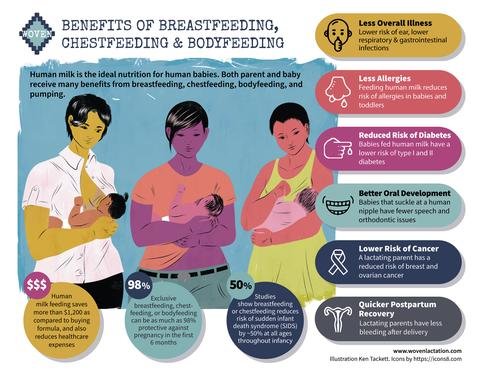Chestfeeding & breastfeeding facts infographic
Here's a resource I made to outline the facts (without pressure or judgement) about breastfeeding, chestfeeding, and bodyfeeding. It's also LGBTQIA+ inclusive. It’s going to feature in my upcoming course, but I wanted to make this available to everybody.
Please share freely if you find it helpful, and let me know if you have any feedback!
I wasn't anticipating needing to make a resource like this myself. But I couldn’t find anything that met my values of inclusivity and non-judgmental support. I have only included topics which are well researched, and you can find the references I used below.
This information is a good place to start, but an introductory course on lactation and a conversation with your midwife or doctor can be a good next step to help your family work out a plan for feeding your baby. A lactation consultant may also be a good resource, especially if you have any specific concerns.
Remember, the conversation about whether or not to breastfeed normally gets simplified when we start making lists about the “benefits of breastfeeding”. I also like to share with my clients the facts and benefits that don't get so much attention (but which I geek out about more!). So while I'm sharing, here's a list of my favorite fun facts about breastfeeding and chestfeeding that aren't included in this resource.
Fun facts about breastfeeding and chestfeeding
When your kid falls over and gets a cut, you can squeeze human milk on it to clean it and help it heal. Because of all those immune factors and awesomeness, it’s even better than Neosporin.
Human milk changes consistency depending on the weather. If you’re hot, the milk is more watery, so that your baby gets hydrated before feeling full.
Nipples actually suck in the germs and such from your baby’s saliva and create milk to fight those exact pathogens. I have clients that mostly pump, but latch the baby every so often just for this reason.
Human milk is full of probiotics. We all know how good those critters are!
Oligosaccharides are a part of human milk that we are just learning about. It’s actually quite a big part, and babies can’t digest them at all. Why are they there you ask? The newest thinking is that they are food for the beneficial bacteria, so that they can thrive in those little digestive tracts.
Humans evolved to suckle at a human nipple, and this action helps to properly develop the shape of the baby’s palate so their teeth come in straighter, they can speak easily, and chew with ease.
Making the best decision about how to feed your baby isn’t always simple, and it is often good to be somewhat flexible, as things may change from day to day, or week to week.
I am building more free resources and low-cost courses—sign up for my newsletter below if you're interested in updates. And you can always set up time to talk to me one-on-one to answer your questions, so you have the information you need to make the decisions that are right for your family.
Download the infographic
Full text
I realize that it’s a very visual resource, and have been working hard to make this blog accessible, so I wanted to include a text-only version.
[Benefits of breastfeeding, chestfeeding, and bodyfeeding]
Human milk is the ideal nutrition for human babies. Both parent and baby receive many benefits from breastfeeding, chestfeeding, bodyfeeding, and pumping.
[Main benefits:]
Less Overall Illness: Lower risk of ear, lower respiratory & gastrointestinal infections
Less Allergies: Feeding human milk reduces risk of allergies in babies and toddlers
Reduced Risk of Diabetes: Babies fed human milk have a lower risk of type I and type II diabetes
Better Oral Development: Babies that suckle at a human nipple have fewer speech and orthodontic issues
Lower Risk of Cancer: A lactating parent has a reduced risk of breast and ovarian cancer
Quicker Postpartum Recovery: Lactating parents have less bleeding after delivery
[Additional points:]
Human milk feeding saves more than $1,200 as compared to buying formula, and also reduces healthcare expenses
Exclusive breastfeeding, chestfeeding, or bodyfeeding can be as much as 98% protective against pregnancy in the first 6 months
Studies show breastfeeding or chestfeeding reduces risk of sudden infant death syndrome (SIDS) by ~50% at all ages throughout infancy
References
"Breastfeeding and reduced risk of sudden infant death syndrome: a meta-analysis", https://pubmed.ncbi.nlm.nih.gov/21669892/
"Does breastfeeding reduce the risk of sudden infant death syndrome?", https://pubmed.ncbi.nlm.nih.gov/19254976/
"Benefits of breastfeeding and women's health", https://pubmed.ncbi.nlm.nih.gov/15583764/
"Breastfeeding reduces breast cancer risk: a case-control study in Tunisia", https://pubmed.ncbi.nlm.nih.gov/19921444/
"Breastfeeding and Breast Cancer Risk Reduction: Implications for Black Mothers", https://pubmed.ncbi.nlm.nih.gov/28818244/
"Financial costs of not breastfeeding …or cost benefits of breastfeeding", https://kellymom.com/pregnancy/bf-prep/bfcostbenefits/
"Contraceptive efficacy of lactational amenorrhoea", https://pubmed.ncbi.nlm.nih.gov/1346183/
"Nutritional and physiologic significance of human milk proteins", https://www.ncbi.nlm.nih.gov/pubmed/12812151
"Breast milk hormones and their protective effect on obesity", https://www.ncbi.nlm.nih.gov/pubmed/20049153
"At the Dawn of a New Discovery: The Potential of Breast Milk Stem Cells", https://www.ncbi.nlm.nih.gov/m/pubmed/25398739
"Maternal and infant infections stimulate a rapid leukocyte response in breastmilk", https://www.ncbi.nlm.nih.gov/pubmed/25505951
"Association Between Breast Milk Bacterial Communities and Establishment and Development of the Infant Gut Microbiome", https://www.ncbi.nlm.nih.gov/pubmed/28492938
"Human milk oligosaccharides: every baby needs a sugar mama", https://www.ncbi.nlm.nih.gov/pubmed/22513036
"Breastfeeding and early white matter development: A cross-sectional study", https://www.ncbi.nlm.nih.gov/pubmed/23721722
"Breast-feeding and optimal visual development", https://www.ncbi.nlm.nih.gov/pubmed/8455123
"Human Milk Oligosaccharides and the Preterm Infant: A Journey in Sickness and in Health", https://pubmed.ncbi.nlm.nih.gov/28159206/

